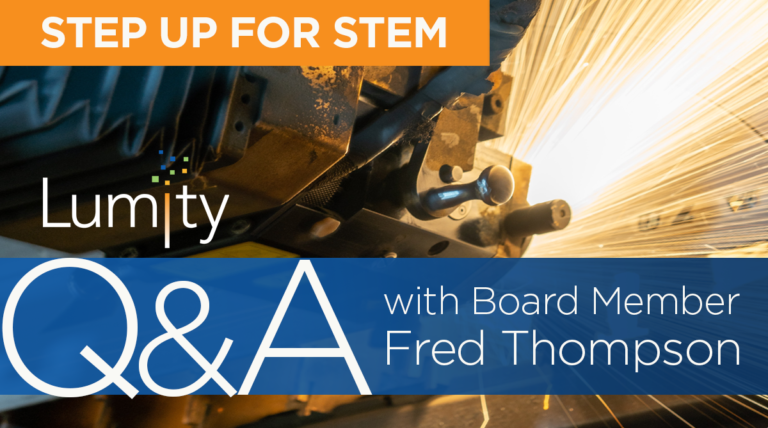A Q& A with Lumity Board Member Fred Thompson
 Fred Thompson is a Lumity board member and one of our key strategic advisors. We wanted to share our recent conversation with Fred about STEM careers, Chicago, and what we need to think about for 2021.
Fred Thompson is a Lumity board member and one of our key strategic advisors. We wanted to share our recent conversation with Fred about STEM careers, Chicago, and what we need to think about for 2021.
On STEM careers
Lumity: Fred, you recruit talent for manufacturing. We believe it can be overlooked as an industry when people talk about STEM careers. What’s your take?
Fred: Yes, I can’t believe it, but I have been recruiting in manufacturing for 20 years. I help companies find talent—plant managers, plant personnel, engineers. It’s interesting because I would hear for years that young people aren’t interested in STEM. But I don’t think it’s about a lack of interest, but more about a lack of exposure and the misconception that STEM is only about science or computer programming.
With programming, you have to be comfortable sitting for most of the day. For people who like to do and move around, that’s not interesting. There is more physicality in manufacturing and, yet, it’s all about STEM—technology, chemistry, building, engineering, and so on. Manufacturing also gives youth more flexibility. They can get a good job without going to college immediately after high school. This gives them work experience to then pursue a two- or four-year degree.
Lumity: You mentioned youth don’t have exposure to different types of STEM. Could you talk more about that?
Fred: When I grew up, there was a much bigger manufacturing presence in Chicago, but many of those companies moved out to suburban areas. Today, young people in Chicago don’t know that those job opportunities exist. So, I work with Lumity to get students exposure to those companies. In my last role, we hosted plant tours for students and introduced them to various positions. It’s really important that kids see people they relate to in different types of STEM jobs and career paths. Even the work I do as a recruiter shows students that they can have different types of roles in different types of STEM companies.
On his own STEM journey
Lumity: You grew up in the Southside. Do you mind sharing your professional journey in STEM?
Fred: I did. I’m a Morgan Park High school graduate familiar with Chicago Public Schools’ landscape. I gravitated toward manufacturing for the many reasons I mentioned. In my first job as a recruiter, I had a choice between recruiting for a software division or for a manufacturing division. I just liked the idea of working with people who made things. I also gravitated toward recruitment and sales because I like the diversity of these roles. Each position I recruit for is different, so I get to meet, talk to, and learn from different types of people.
On removing systemic barriers
Lumity: Black Lives Matter, the COVID-19 pandemic, and so much of 2020 shed light on systemic racism. You, our board members, and staff have been and continue to be specifically focused on creating education and economic pathways for and with Chicago youth. What assumptions are we all making and how can we do better?
Fred: I think we do make too many assumptions about who kids are or what they need. The kids in the Southside of Chicago have so many skills they use to maintain their day-to-day lives. They have to negotiate for their safety, resolve conflicts, mitigate tensions, and be strategic in different environments. These are the skillsets they can use in manufacturing as a production or unit supervisor. The kids just don’t realize that the skills they’ve developed for everyday life are valuable for the workplace too. If you can negotiate for your safety, you can certainly handle a meeting at work.
We also have to recognize that their communities have been depleted of manufacturing and other employment opportunities. When I was growing up, Ford was around the corner from my house and so many of the people I knew worked right in the area. We often assume most of the youth are from broken homes or don’t have parental guidance, but that’s often not the case. Even with the best parental guidance, youth are influenced by the environment outside of their homes and that’s challenging when they don’t see or experience economic opportunity in their neighborhoods. We need to figure that out. We need to start by doing a better job of helping young adults see the opportunities that exist and then physically get to those jobs.
